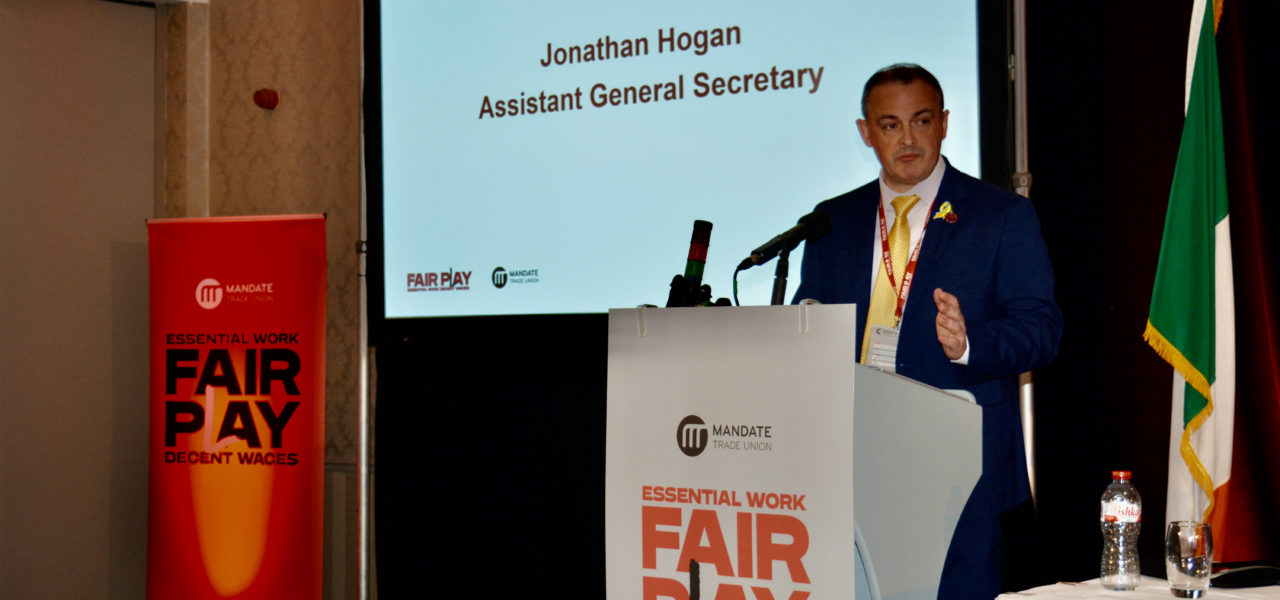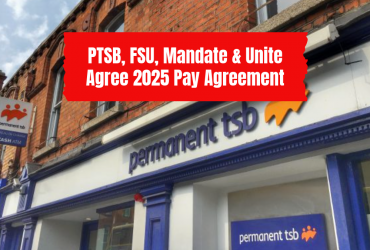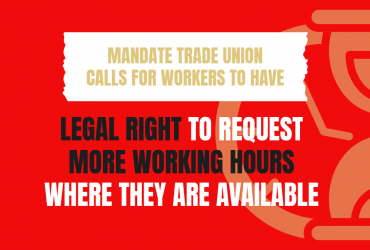
Address of Jonathan Hogan, Assistant General Secretary of Mandate to BDC2022
Tuesday 5 April 2022President, General Secretary, Members of the National Executive, Delegates
I welcome this opportunity to be able to speak to you today here in Castlebar, a town that represents in many ways the history of our humble beginnings as a Retail Union. Not far from here and over 100 years ago, Michael O’Lehane, pioneer of the union movement and founding member of Mandate’s predecessor Union the Irish Drapers Assistants Association went on an Organsing and recruitment drive through the West of Ireland, setting up branches in Ballina, Ballinrobe, Ballyhaunis, Claremorris, Westport and finally here in the town of Castlebar. One of his main aims all those years ago was to reduce the working week for shop assistants, set up collective agreements to cover overtime pay, as well as improving minimum pay and conditions generally across retail. It’s ironic Delegates that as we sit here today all these years later, some employers have set about dismantling these premium payments particularly as we emerge from the pandemic.
While Mandate and our predecessors have tried to build on Michael’s legacy, enhancing our members terms and conditions of employment, I must say Delegates there is still much more to do.
Flexible rosters generally across retail and the license/hospitality trade, still prevent workers, committing to activities outside of work, everything from returning to study to caring for loved ones, is interrupted by the contractual flexibilities in favour of the employer that prohibits these events, which is the unacceptable reality for so many workers on the frontline within retail and hospitality.
How can this be fair, how can it be the case that a century later, we are still challenged with some of the uncertainties that existed so long ago. As a revitalised Union, I’m calling on all retail workers to join us in our fight for better terms and conditions across the sector, to make claim for better pay and the sustainability of decent jobs across the industry, to give certainty to people regarding when they work and how much they paid.
Retail workers must look beyond traditional pay bargaining objectives and demand ethical trading initiatives and environmentally sustainable policies from their employer that sets out to protect the human rights of all workers through the supply chain. The sustainable nature of decent jobs must include the provision of decent employer contributory pension schemes that every employer should provide as part of their social contribution to the lifelong security of their employees.
These requirements must become our core objectives in our collective bargaining strategies, in addition to the effective implementation of family friendly policies and employee development programmes – working in retail must be valued more and in turn this should be reflected in our members terms and conditions of employment.
As we move forward, Mandate’s collective bargaining strategy will seek improvements in the starter rates within the sector. This strategy has begun, with a clear focus on pay increases that sees those most vulnerable receiving the greatest help. This objective is based upon our socialists’ values of decency, our common goals must be driven by a deep desire to bring all our members, up to an acceptable standard of living that reflects the essential status that has been rightly attributed to customer facing frontline workers since the onset of the pandemic in March 2020. We must be unwaivered in our approach and fulfilled in our commitment to pursue a higher Union entry rate for retail frontline workers beyond the minimum wage and in line with the living wage. No essential worker in this country should have to work on the frontline for the minimum wage. Why is it so, that despite the essential need for retail workers, despite the essential status reflected by society on retail workers during the past 24 months that we still find ourselves having to justify time and time again why our members deserve decent pay and conditions.
I want to remind Delegates that on the 15 April 2021 during the height of the pandemic, our Tánaiste said:
“The pandemic has caused us to redefine frontline or essential workers and to reconsider the value we place on their work and the reward they should get for that work.
“Traditionally, when we thought of frontline or essential workers, we thought of nurses, doctors, Gardaí or firemen. Generally, people working in the public service with relatively well paid, secure and pensionable jobs. Now we think also of retail workers, drivers, security guards, transport workers and cleaners.
Well Tánaiste we are 12 months on from when you made that statement, 12 months on our members are still working on the frontline confronted with as much Covid 19 as before, 12 months on our members are still providing that essential service, so many of us have grown to deeply depend on and appreciate, so Tánaiste let this Conference be the defining moment when every retail worker is not only recognised as an essential worker but paid as an essential worker. In support of the General Secretary’s statement this morning, I’m now calling on the Government to honour the spirit of the Tánaiste’s comments just over 12 months ago and to introduce the living wage as a new minimum starter rate for all low paid essential frontline retail workers across the sector. Not one person in retail serving on the frontline, recognised by the Tánaiste as an essential worker should be paid the minimum wage.
Mandate members the length and breadth of this country deserve better. Covid 19 has thought us many things, much of which is based upon the principle of having no regrets. We should live each day with a renewed optimism and respect, a second chance some might say, remembering our family, friends and all of those workers across the many industries that we have lost during the pandemic and in many cases as a result of the pandemic. The no regrets for Mandate must be the foundation stone of pursuing nothing but the best for workers within the industries we represent our members in. Everything from decent pay to the broader aspects of decent working conditions must be demanded and fought for by the Union.
As highlighted by the General Secretary this morning, these demands must be supported by legislating and recognising the rights of workers to collectively bargain and be represented by their chosen trade Union. These legislative changes must be driven by the workers and led by the workers. This fight must not be left to our members alone, the Irish Trade Union movement needs to mobilise around this issue and the effective implementation of any future robust collective bargaining legislation must be seen as paramount to the future proofing of the Irish Trade Union movement.
Training
In addition to and in order to support the pursuit of our Industrial Relations Strategy is our need to constantly develop our activists. Over the past number of years, Mandate has welcomed hundreds of members through our training process, through our work with various organisations, such as ICTU, CWU where we continue to deliver training and learning opportunities that’s flexible enough to accommodate the learners needs and bring training to the learner. I am proud of the Activists who participated and the training we managed to maintain through Covid. With the onset of Covid 19 in March 2020, and the unforeseen circumstances that unfolded, we were confronted with a schedule of classroom training courses that firstly were not designed for Zoom, Microsoft teams, Webex or any other conferencing platforms you can think of. Before Covid, when people spoke about zoom, they were talking about adjusting the lens on a camera, a reference to Microsoft teams used to be a management reference to Microsoft colleagues, now these simple words reflect the new reality of communications and we all had to embrace these new ways of working. Mandate was one of the first Unions to offer training on Conferencing and learning platforms, which wasn’t ideal, we made mistakes, but nevertheless despite the drawbacks of it all, we tried in so far as possible to maintain Activist’s learning supports during the height of the pandemic.
I want to acknowledge the work of our Tutors, who assisted in the redesign of their course material, which would see some of our course offerings migrate to evening learning sessions. With the support of all our staff and you the activists we have managed to fundamentally and steadily change our approach to training, how we think of learning, moving away from the traditional and sole reliance on individual representative skills to better and more effective collective organising methodologies that supports our growth objectives. Learning must happen all the time and our learning approach must be flexible to adapt and change to meet the needs of our Activists, that’s why since 2019, the growth and demand for short workshops is steadily, outpacing our traditional three-day training courses. Our approach to learning is changing and our course offerings will continue to reflect the needs of the members and you the Activists. The use of digitised learning content will also complement our traditional learning opportunities as we continue to grow. The need for physical learning spaces has been replaced by convenience and remote learning. Peoples desire to learn is now met with instantaneous ways of learning. I want to take the opportunity to pay a special tribute to our Activists who completed our leadership course. On the 7th October 2019 we launched our new leadership programme, a new concept in learning, offering a variety of modules from various experts. The programme was meant to last 12 months, but due to Covid 19 it would be the end of 2021, by the time it was completed. There were 16 participants originally on the programme. There were 7 leaders who completed the course. They were:
Brian Fogarty
Ken Reilly
Tony Meehan
Doreen Curley
Sarah Byrne
Cathy McLoughlin
Samantha Farrell
Well done to everyone who participated.
Research
In December 2021, the Union commissioned a report and research into the precarious work within the retail sector and its impact on retail workers, which will include topics such as uncertainty of earnings, uncertainty of working patterns and their effect on cost & quality of living standards, social integration, as well as the broader social views of climate action or inaction, as well as sustainable employment/ethical trading standards across the retail sector. I believe this research will act as a catalyst and be supportive of both future and current campaigns, not least the “Raise the Roof campaign”, which is being coordinated by ICTU and championed by likeminded both political parties and Trade Unions. Given the housing crises, the rise in building for rent planning applications, the future for home ownership in this country is a disaster. Over the next number of months, the Raise the Roof network will be holding a number of regional events and I would encourage every activist and every member in Mandate to join this campaign to reverse the shambolic economic decisions of the current government in relation to the provision of homes. The answer cannot be around simply building units, the objective must be about the construction of homes.
The research will also support our ability to realise the vision set by Michael O’Lehane, Cissie Cahalan and Patrick Moran, whom we have celebrated in our training awards. What they left behind was what they said, what they did and what they stood for which was to achieve a better working environment and fairer society. To this end, the research will inform future training and learning content for our Activists, as well as our future campaign strategies. It is also envisaged that with the help of Conor McCabe, who you will also hear from tomorrow, we will begin in 2022 with a budget submission making claim to the various economic policies that our members require from Government. It is time that the collective voices of Mandate’s membership are heard both in the workplace and in Government. If we can’t convince or change the views of the employers, well delegates we must change the world around them.
As a relatively new Assistant General Secretary to this Union, a Union which I have grown up in for the last 27 years, my own vison is for Mandate to become an advocacy for change for our members across the sectors we represent. Beyond the employment contract Mandate must be the vanguard for change in economic policy that supports our members. Positive changes to the working environment must be complemented by fair economic policies that support low paid workers. Mandate must always be acutely aware of our members needs and represent their interest both nationally and locally, both in the workplace and politically.
Our role as a social movement must be to resist the growing housing crises and support our members and this generation in one day being able to call a place their home. The rise in working poverty, the indecency of not having equal access to education and opportunity, the deficiency of climate action and not having access to a proper working health system are some of the issues that Mandate members must confront. We must tackle these problems by reaching out to like-minded organisations, political parties and sister Unions and seek to strengthen ties in order to pursue a better Ireland for low paid workers. Improvements to the employment contract must be met with the socio-economic changes that impact all low paid workers and we must do this constantly.
Delegates let this be the time of great change for all our members, a reaffirmation of the aims of our predecessors for better terms and conditions and a fairer society.
Let’s follow this vison for the betterment of all our members and collectively let us write ourselves into the history books to ensure the next chapter of Mandate is passed on to future generations.
Thank you all and enjoy your Conference





